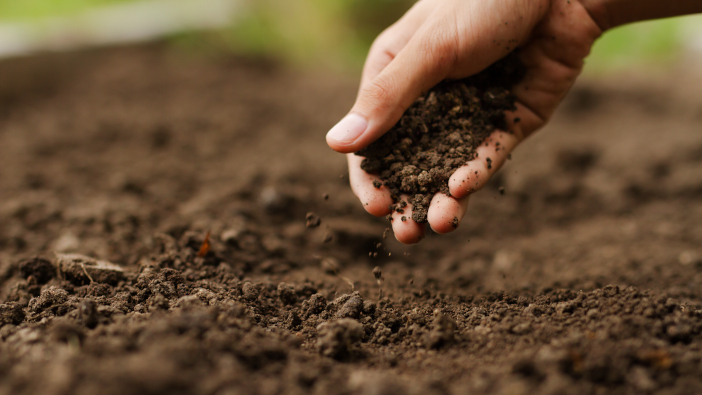Farmers face a ‘postcode lottery’ if plans to reward them financially for increasing soil carbon stocks are to be introduced, two leading soil scientists will warn a major farming conference.
Presenting their data today (Thursday) at the University of Cambridge, Rothamsted’s Professor Andrew Neal and Professor David Powlson will say geological history alone, which determines the type of soil found on a farm, will make capturing more carbon in the soil “nigh on impossible” for some farmers.
Speaking ahead of the conference, Professor Neal said: “If you farm on sandy soils, as is the case for farmers in places such as Bedfordshire or Nottinghamshire, then you will struggle to increase the carbon content of your soil. You might be doing all the right things to increase the carbon flowing through your soil, but it won’t show up when they come to test your soil.”
Common ways to improve soil carbon include the addition of manure or crop residues, growing cover crops in the winter and the rearing of grazing livestock and crops together.
Under proposals put forward by the Government as part of its post-Brexit shake-up of UK agriculture, farmers would be paid to manage their farms using such environmentally friendly practices, often termed ‘regenerative agriculture’.
The problem, says Professor Neal, is that the potential for carbon sequestration is strongly influenced by soil type—particularly texture—and the starting carbon content, which will be a legacy of past farming practices.
“Changes in soil carbon in response to alterations in management practice occur slowly. It’s also difficult to measure the likely small changes in soil carbon within a short time period; indicators such as soil microbial biomass are useful in showing whether organic carbon is increasing or decreasing in response to a change of management – but these measurements provide neither an estimate of soil carbon stocks nor a prediction of absolute changes in carbon.”
Speaking at the annual IFS Agronomic Conference, Professor Neal and Professor Powlson will propose an alternative system that measures the flow of carbon through the soil, rather than the actual amount in the soil at a given time – what Professor Neal calls a “dynamic rather than static” view of soil.
“If a system of policy requirements or financial incentives for increasing soil carbon is to be instituted, we propose an alternative approach using carbon models to predict probable changes in soil carbon taking account of the farmer’s soil type, local climate, cropping practices and starting soil carbon content. This could be combined with closer monitoring at a network of benchmark sites.”
Careful thought needs to go into designing replacements for current EU farm subsidies, added Professor Powlson, as there are formidable challenges to doing this in ways that are both fair and practical.
“There is much interest in sequestering carbon in the soil as a means of mitigating climate change by making payments to farmers in return for the amount of carbon sequestered. There are several ‘early warning’ methods that may be successful in detecting whether or not the soil is increasing its carbon content, and this is helpful. But they will probably not provide direct evidence of the absolute change in total carbon that has occurred.”
Soil organic matter contains about 50% carbon and influences virtually all soil properties. Recent research using Rothamsted soils by Professor Neal and colleagues has shown how the structure of the soil is affected by the processing of organic matter inputs by soil microbes as metabolites form associations with mineral particles. The resulting structure in turn impacts oxygen diffusion through the soil and the microbial processing of carbon and other nutrients important for crop and livestock nutrition.
“Imaging of pore networks clearly shows how a clay-rich soil adapts to differences in organic inputs, but a sandy soil shows little adaptation. Thus, the physical structure and resulting changes in biological activity, are less influenced by organic inputs in sandy soils. This is consistent with the observation that sandy soils have much less capacity to sequester carbon than soils of finer texture,” he said.


